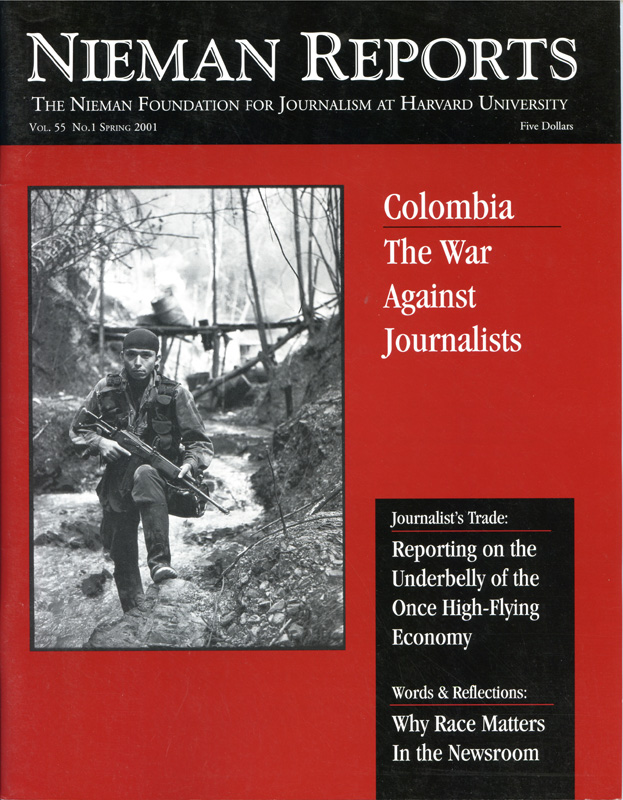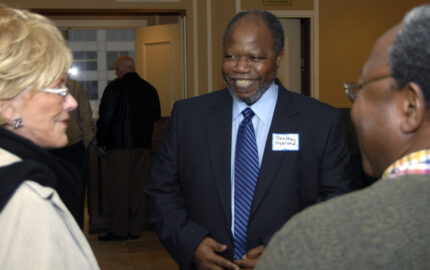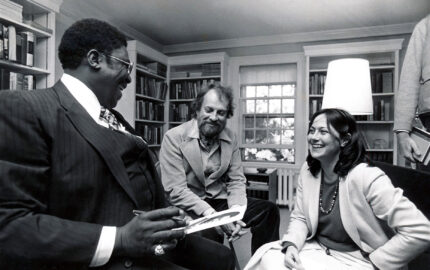Diana Butler Thomson died on November 29, 2000, at Cambridge Hospital in Cambridge, Massachusetts, of heart failure. She was 65. With her death, the Nieman Foundation lost a unique presence and one of the innovators of the modern Nieman program.
Diana and her husband, James C. Thomson, Jr., came to the Nieman program in 1972, when Jim was named Curator by then Harvard President Derek C. Bok. Despite the good work of the previous Curator, Dwight Sargent, to make the foundation financially sound, the Thomsons were encouraged to reshape the program to help Nieman Fellows and their families better cope with the dramatic changes that come, often unexpectedly, with a Nieman year. They also came to the program when the country was still reeling from the women’s movement and ongoing struggles about civil rights. Many organizations were straining to rework the way women and minorities fit into the workplace. Inevitably, the Nieman program would have to reflect and respond to these changes.
Diana and Jim approached change with fearlessness and enthusiasm. Diana, in particular, relished the chance to bring a fresh eye to the role women and minorities played in the life of the program. Traditionally, spouses (usually wives) were not included in day-today Nieman life. Once each semester, they were invited to a “wives’ dinner” at the Harvard Faculty Club. And while Harvard allowed spouses of faculty members (Nieman spouses fell into this category) to audit classes, they rarely felt comfortable enough to face a room full of intimidating Harvard students. Most spouses had to leave their homes, jobs, larger family circle and friends for a small, stripped-down, student-like apartment in Harvard Square. And there they often remained while their husbands were taken on an incredible intellectual and (largely) fraternal journey.
Diana changed all that. With Jim’s input and support, she helped initiate a major policy switch: Nieman spouses were to be given the same privileges as fellows. They would now be welcome at all Nieman seminars; they would be given keys to our headquarters; they would be encouraged to audit Harvard classes. But how would they be able to participate when there were children to care for? Diana and Jim created a babysitting allowance, a stipend for parents to use so that both fellow and spouse could attend seminars, go to classes or the library, or just have a few quiet minutes together to walk along the banks of the Charles River. They made sure that the “two for the price of one” policy would not be in name only.
Diana also encouraged the selection of more women, minority and overseas journalists, and revived the tradition of offering fiction writing seminars for fellows and spouses. As a poet, critic and longtime Harvard teacher of fiction writing, Diana was the ideal person to reestablish the teaching of writing in the Nieman program. While some felt her style was too unconventional and her approach to critiquing writing too psychologically oriented, her keen mind and eye brought many writers to her seminars. The seminars met a strong interest then, and remain a staple of the Nieman program today.
I began working at the Nieman Foundation as assistant to the Curator in 1973, the year after Jim and Diana arrived. And my recollection is that the changes did not necessarily come about smoothly and that not all the fellows or spouses were happy with them. A few of the fellows felt we were intruding into their private world. A few said that at seminars they were uncomfortable “being a journalist in front of their wives” by asking questions of the guests. Some women fellows, who invariably were asked by Harvard faculty which fellow was her husband, felt spouses would add to the difficulty that they had being recognized as fellows.
But Jim and Diana would not allow the early tension and discomfort to stop progress. I knew we were going to be all right when, a few years into the new system, I overheard an outgoing fellow tell an incoming fellow not to worry: “Once you get here, you just forget who’s the fellow and who’s the spouse.” It was exhilarating for me to be at the heart of the process, coaxing change, helping to make it work.
Diana was never a journalist herself. But her bold ideas and her and Jim’s willingness to reshape the Nieman experience had a deep effect on the fellows and their families. To this day, the benefits that Jim and Diana designed for the fellows have remained in place. Through their efforts, the Nieman program adapted itself to changing times, sometimes struggling and straining to do so. It wasn’t easy, and it might not always have been accomplished as gracefully as possible. But the passion and vision Diana instilled into the Nieman program became embedded in its structure and will benefit fellows long into the future.
Lois Fiore is assistant editor of Nieman Reports.
Diana and her husband, James C. Thomson, Jr., came to the Nieman program in 1972, when Jim was named Curator by then Harvard President Derek C. Bok. Despite the good work of the previous Curator, Dwight Sargent, to make the foundation financially sound, the Thomsons were encouraged to reshape the program to help Nieman Fellows and their families better cope with the dramatic changes that come, often unexpectedly, with a Nieman year. They also came to the program when the country was still reeling from the women’s movement and ongoing struggles about civil rights. Many organizations were straining to rework the way women and minorities fit into the workplace. Inevitably, the Nieman program would have to reflect and respond to these changes.
Diana and Jim approached change with fearlessness and enthusiasm. Diana, in particular, relished the chance to bring a fresh eye to the role women and minorities played in the life of the program. Traditionally, spouses (usually wives) were not included in day-today Nieman life. Once each semester, they were invited to a “wives’ dinner” at the Harvard Faculty Club. And while Harvard allowed spouses of faculty members (Nieman spouses fell into this category) to audit classes, they rarely felt comfortable enough to face a room full of intimidating Harvard students. Most spouses had to leave their homes, jobs, larger family circle and friends for a small, stripped-down, student-like apartment in Harvard Square. And there they often remained while their husbands were taken on an incredible intellectual and (largely) fraternal journey.
Diana changed all that. With Jim’s input and support, she helped initiate a major policy switch: Nieman spouses were to be given the same privileges as fellows. They would now be welcome at all Nieman seminars; they would be given keys to our headquarters; they would be encouraged to audit Harvard classes. But how would they be able to participate when there were children to care for? Diana and Jim created a babysitting allowance, a stipend for parents to use so that both fellow and spouse could attend seminars, go to classes or the library, or just have a few quiet minutes together to walk along the banks of the Charles River. They made sure that the “two for the price of one” policy would not be in name only.
Diana also encouraged the selection of more women, minority and overseas journalists, and revived the tradition of offering fiction writing seminars for fellows and spouses. As a poet, critic and longtime Harvard teacher of fiction writing, Diana was the ideal person to reestablish the teaching of writing in the Nieman program. While some felt her style was too unconventional and her approach to critiquing writing too psychologically oriented, her keen mind and eye brought many writers to her seminars. The seminars met a strong interest then, and remain a staple of the Nieman program today.
I began working at the Nieman Foundation as assistant to the Curator in 1973, the year after Jim and Diana arrived. And my recollection is that the changes did not necessarily come about smoothly and that not all the fellows or spouses were happy with them. A few of the fellows felt we were intruding into their private world. A few said that at seminars they were uncomfortable “being a journalist in front of their wives” by asking questions of the guests. Some women fellows, who invariably were asked by Harvard faculty which fellow was her husband, felt spouses would add to the difficulty that they had being recognized as fellows.
But Jim and Diana would not allow the early tension and discomfort to stop progress. I knew we were going to be all right when, a few years into the new system, I overheard an outgoing fellow tell an incoming fellow not to worry: “Once you get here, you just forget who’s the fellow and who’s the spouse.” It was exhilarating for me to be at the heart of the process, coaxing change, helping to make it work.
Diana was never a journalist herself. But her bold ideas and her and Jim’s willingness to reshape the Nieman experience had a deep effect on the fellows and their families. To this day, the benefits that Jim and Diana designed for the fellows have remained in place. Through their efforts, the Nieman program adapted itself to changing times, sometimes struggling and straining to do so. It wasn’t easy, and it might not always have been accomplished as gracefully as possible. But the passion and vision Diana instilled into the Nieman program became embedded in its structure and will benefit fellows long into the future.
Lois Fiore is assistant editor of Nieman Reports.



